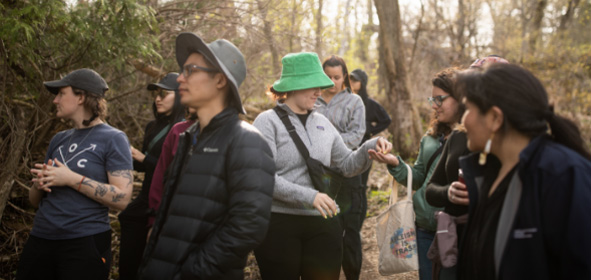While engaged in experiential learning opportunities, you will learn by doing and by reflecting on your experiences. Throughout the process, supports are available to help you navigate the experiential learning landscape at the University of Toronto: as you explore, prepare, undertake and reflect on lessons learned.
Prepare for Your Experiential Learning Opportunity
Preparation is a key component of your experiential learning opportunity: exercises, supports and resources often get incorporated into these opportunities to help you feel ready. The EL Hub shares guidelines and procedures to help you understand placement agreements, insurance and liability coverage and health and safety policies. The modules on intellectual property and non-disclosure agreements also help you to understand your rights and responsibilities entering an experiential learning opportunity.

Self-Directed Modules
These modules will help you navigate your way through experiential learning at the University. Each module focuses on a different aspect of experiential learning. You can consider your responsibilities when engaged in experiential learning; gain a deeper understanding of your strengths, values and interests; learn about the value of reflection; set goals and create a personal learning plan to ensure you develop the competencies that matter to you; and reflect on those competencies while learning how to speak about them on resumes and in interviews. You can also learn more about Community-Engaged Learning.
Roles and Responsibilities
Learn about roles and responsibilities when engaged in experiential learning opportunities.
Reflection
Learn about what reflection is and why it is essential to experiential learning.
Developing a Personal Learning Plan for Competency Development
Establish your own goals for developing competencies while participating in an experiential learning opportunity.
An Introduction to Community Engaged Learning
Understand the key features of community-engaged learning and consider how your goals align with the community partner’s priorities.
Understanding Your Strengths, Values and Interests
Articulate how your strengths, values and interests relate to an experiential learning opportunity.
Setting Goals for Experiential Learning
Explore strategies for setting goals to get the most out of your experiential learning experience.
Reflecting on your Competency Development
Identify and articulate the competencies you developed while participating in an experiential learning opportunity for use on resumes and in interviews.
Preparing for Your Community Engage Learning Experience
Develop strategies to maximize your learning in a community-engaged learning course.

Accessibility
If you require an accommodation related to an experiential learning opportunity, you may connect with one of the accessibility services offices at the University of Toronto. Staff at these offices will be able to advise you on the disclosure of your accommodation requirements, as well as support you through the process of determining and negotiating effective accommodations for your individual circumstances.
All U of T campuses (St. George, Mississauga and Scarborough) have a service for students with disabilities. While they work independently, all three offices collaborate to ensure that the services work within the frameworks of common objectives.
The mission of accessibility services offices at the University of Toronto is to provide students with a network of resources to succeed at the University of Toronto, both inside and outside the classroom. These offices strive to create a safe and comfortable community for students where they can navigate their disability and related barriers, facilitate peer support and interactions, and provide various academic and social opportunities.
Accessibility Services uphold the Ontario Human Rights Code, the Accessibility for Ontarians with Disabilities Act and the University of Toronto’s Statement of Commitment to Persons with Disabilities.

